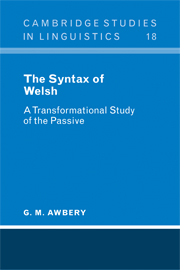5 - OTHER AGENT TRANSFORMATIONS
Published online by Cambridge University Press: 04 August 2010
Summary
It was pointed out in section 2.7 that most of the rules required in the derivation of the passive are independently needed in the derivation of other forms. In this chapter the possibility is explored that T. Agent Postposing is also independently needed. Three constructions are examined where it appears that the subject noun phrase is postposed into a prepositional phrase as object of the preposition gan (by). These are impersonal passives, certain adjectival constructions, and certain nominal constructions. In each case the movement transformation is formulated and compared with T. Agent Postposing.
Impersonal passives
Impersonal passives Just as there are pairs of synonymous active and passive sentences, so there are also pairs of synonymous active and impersonal passive sentences. Examples are given in (1) to (6).
(1) Rhybuddiodd y dyn y plant.
Warned the man the children.
(2) Rhybuddiwyd y plant gan y dyn.
Warned the children by the man.
(3) Rhybuddiai'r dyn y plant.
Was warning the man the children.
(4) Rhybuddid y plant gan y dyn.
Was warning the children by the man.
(5) Rhybuddia'r dyn y plant.
Warns the man the children.
(6) Rhybuddir y plant gan y dyn.
Warns the children by the man.
In fact the impersonal passives are traditionally considered equivalent to the cael passives though stylistically superior to them.
Information
- Type
- Chapter
- Information
- The Syntax of WelshA Transformational Study of the Passive, pp. 146 - 199Publisher: Cambridge University PressPrint publication year: 1977
